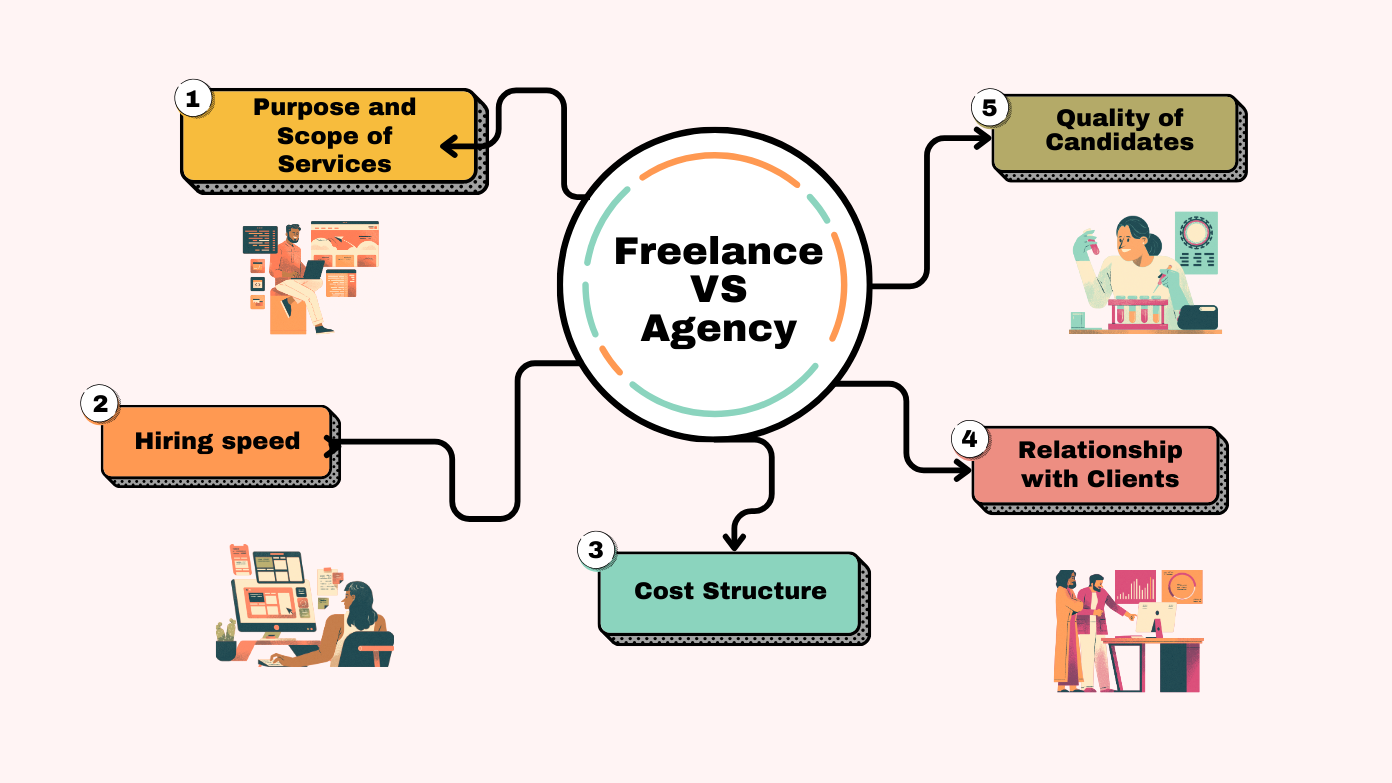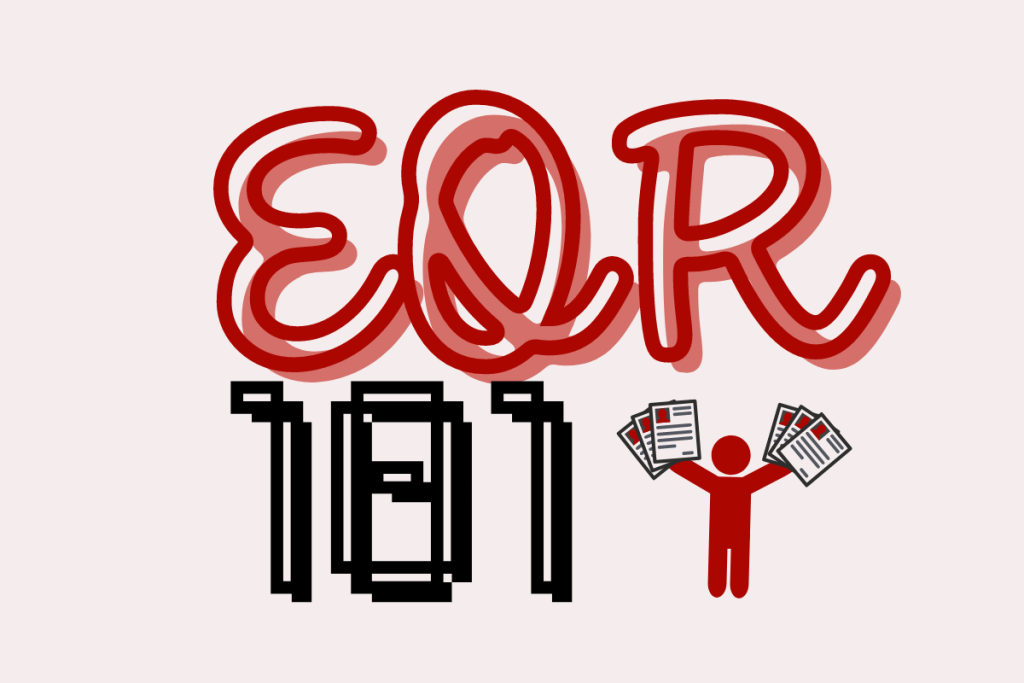Recruitment Agency or Freelance Recruiter are two popular service types that can help you build your dream team. However, you may be uncertain about which service type would be most effective for your business. Don’t worry!
In this blog post, we will clarify the differences between Recruitment Agencies and Freelance Recruiters to help you make the best choice. Let’s dive in with Leamar Hiring to understand what Recruitment Agencies and Freelance Recruiters are!
I. Defining Recruitment Agencies and Freelance Recruiter
Freelance recruiter is an independent recruitment expert who operates autonomously and is not affiliated with any specific company. They provide recruitment services to various businesses, often working on short-term contracts or project-based engagements. Freelance recruiters have the flexibility to manage their own work, choosing the clients and projects they want to take on. They typically utilise multiple channels to source candidates, including social media and job boards.
Recruitment Agency is an organisation that specialises in providing services to search for and introduce candidates for job positions within companies. This agency acts as an intermediary, connecting job seekers with employers to help both parties achieve their objectives. Recruitment agencies also offer consulting services to businesses regarding company culture, business goals, and specific requirements for the positions to be filled. They assist companies throughout the entire recruitment process, from organising interviews to negotiating contracts.
These are the basic definitions of the two services, and this is what you need to know before making a choice.
II. 5 Key Points to Consider
According to a survey from LinkedIn, 73% of employers reported that candidates they reached through recruitment agencies were of higher quality. This indicates that agencies are more effective at identifying and attracting top talent.
However, we should not overlook the effectiveness of freelance recruiters. The choice between the two should depend on the specific conditions and needs of each company.
Here are five important factors to consider when choosing between a recruitment agency and a freelance recruiter:

1. Purpose and Scope of Services
A recruitment agency emphasises a holistic approach to hiring, seeking candidates who not only possess the necessary skills but also fit well within the company’s culture. This comprehensive strategy ensures that candidates are aligned with the organisation’s values and long-term objectives. As a result, by prioritising cultural fit, agencies enhance employee retention and satisfaction, contributing to the overall success of the company.
In contrast, freelance recruiters typically focus on short-term or project-specific roles. Their primary objective is to quickly fill vacancies rather than providing strategic solutions that align with the company’s long-term vision. Consequently, this reactive approach can limit their ability to fully understand and address the unique needs of the organisation, potentially resulting in hires that do not integrate well into the company culture.
2. The rate of closing vacancies or the hiring speed
The efficiency with which vacancies are filled is significantly affected by both the size of the candidate database and the range of resources, tools, and methodologies that recruiters can leverage. In this context, recruitment agencies clearly excel. They operate on a much larger scale, affording them extensive capabilities for sourcing and selecting candidates, far surpassing the capacities of in-house teams that predominantly depend on their internal resources and a relatively limited pool of candidates. Moreover, recruitment agencies can deploy a greater number of seasoned sourcers and recruiters, which allows them to efficiently identify and place suitable candidates in the shortest possible time frame.
On the other hand, freelance recruiters face more challenges in this regard. Their access to candidates is often restricted to a smaller database, and the tools they can use are limited. This situation requires significant financial investment and ongoing effort to maintain, which is often beyond the means of a single freelancer. Consequently, they may struggle to match the speed and efficiency of larger recruitment agencies.
3. Quality of Candidates
When assessing the quality of candidates, recruitment agencies consistently outperform freelance recruiters, and several statistics underscore this distinction. Recruitment agencies typically implement rigorous screening processes that include in-depth interviews, skills assessments, and background checks. According to a survey by the American Staffing Association, 70% of employers reported that using a staffing agency resulted in higher quality hires compared to those found through other means.
Agencies also benefit from extensive networks built over years of operation, granting them access to a wider talent pool. Research indicates that up to 80% of job seekers are passive candidates—those not actively looking for a job but open to opportunities. Recruitment agencies are adept at engaging these candidates, which can lead to better matches. Furthermore, a study by LinkedIn found that companies that prioritise employee referrals and passive candidates experience 55% faster hiring times.
Moreover, recruitment agencies utilise specialised tools and technologies for candidate evaluation. For instance, organisations using Applicant Tracking Systems (ATS) report a 70% reduction in the time spent on recruitment tasks. This efficiency allows agencies to thoroughly assess both hard and soft skills, ensuring candidates are not only technically qualified but also culturally aligned with the organisation.
In contrast, freelance recruiters often face limitations that hinder their ability to deliver high-quality candidates. With smaller candidate databases and fewer resources, they may rely heavily on job boards, which can restrict their selection to active job seekers. A report from the Society for Human Resource Management (SHRM) indicates that freelance recruiters typically have access to 30-40% fewer candidates than agencies, which can significantly impact the diversity and quality of their candidate pool.
Additionally, freelance recruiters may lack the experience and access to advanced assessment tools, which can compromise their evaluation depth. A survey by the National Association of Colleges and Employers (NACE) revealed that 60% of employers feel that freelance recruiters do not conduct thorough enough assessments, leading to potential mismatches between candidates and roles.
Ultimately, while freelance recruiters can meet urgent hiring needs, they may not consistently provide the high-calibre candidates that recruitment agencies can. The latter’s comprehensive evaluation processes, extensive networks, and specialised expertise—backed by solid statistics—make them the preferred choice for organisations seeking top talent aligned with their long-term objectives.
4. Cost Structure and Financial Implications
Recruitment costs encompass several significant factors, such as salaries, payment expenses, software equipment, workspace, and other costly materials. When comparing options, it is clear that utilising the services of a professional recruitment agency often proves to be more cost-effective. These agencies typically charge based on a percentage of the hired candidate’s annual salary, ranging from 15% to 25%. This means you only pay when you achieve a positive result, minimising financial risk and ensuring that you only spend money when a suitable candidate has been found.
Additionally, partnering with a recruitment agency can help you save on other associated costs of maintaining an in-house recruitment team, such as employee salaries, insurance, vacation costs, and office expenses. An agency can optimise the recruitment process and reduce the time and effort required to find candidates.
On the other hand, the most economical way to hire new employees may be to contact a freelance recruiter. Freelance rates are generally lower, with fees charged hourly or per project. This allows you more flexibility in budget adjustments and only paying for services when truly needed.
However, it is important to note that focusing solely on costs may lead you to overlook other critical factors, such as candidate quality and the recruitment process itself. While freelancers may be a more cost-effective choice, they might lack the experience and resources necessary to find high-quality candidates.
Therefore, at this stage, freelancers lead in terms of cost, but it is essential to consider other factors before making a final decision.
5. Relationship and Engagement with Clients
Recruitment agencies excel in nurturing long-term relationships with their clients, positioning themselves as strategic partners in the hiring process. They dedicate significant effort to understanding the client’s culture, values, and long-term objectives, enabling them to craft customised recruitment strategies. This ongoing partnership fosters better alignment between the candidates sourced and the organisation’s goals, ultimately resulting in higher-quality hires and reduced employee turnover.
On the other hand, freelance recruiters tend to operate within a short-term framework, concentrating on immediate staffing requirements. Their focus is often more transactional, emphasising quick placements rather than a strategic approach. While freelancers can efficiently fill roles in the short run, they may lack the in-depth understanding of the client’s business context that recruitment agencies develop over time. This distinction can affect the overall quality of hires and their integration into the company.
The decision between working with a recruitment agency or a freelance recruiter can greatly impact not only the efficiency of the recruitment process but also the long-term success and cohesion of the organisation.
Remember that there is no one-size-fits-all solution. Each option has its merits and drawbacks. The key is to find the best fit for specific business requirements, considering both short-term and long-term goals for the company. The ultimate choice is an investment in the future of your business. Be confident that your decisions are well thought out, and the chosen solution aligns seamlessly with the unique character and goals of your organisation.
III. Conclusion
In conclusion, the decision between a Recruitment Agency and a Freelance Recruiter is crucial and can significantly influence your organisation’s hiring success and overall growth. Recruitment agencies, like Leamar Hiring, offer a wealth of resources, extensive networks, and a strategic approach that enhances the quality of hires and fosters long-term partnerships. On the other hand, freelance recruiters can provide more flexible and cost-effective solutions for immediate staffing needs.
At Leamar Hiring, we specialise in understanding the unique requirements of your business and aligning our recruitment strategies with your company’s culture and vision. We are dedicated to helping you build your dream team, ensuring that every candidate not only possesses the necessary skills but also fits seamlessly into your organisational environment.
If you’re looking to optimise your hiring process and make informed decisions, contact Leamar Hiring today. Let us be your trusted partner in achieving your recruitment goals! Additionally, don’t forget to explore our article on the best recruitment agency to further enhance your recruitment efforts.



